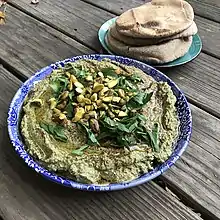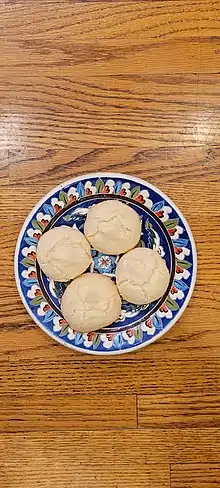Nawal Nasrallah
Nawal Nasrallah is a U.S.-based Iraqi food writer, food historian, English literature scholar, and translator from Arabic into English.[1] She is best known for her cookbook featuring Iraqi cuisine, entitled Delights from the Garden of Eden, and for editions of medieval Arabic cookbooks, including Annals of the Caliphs’ Kitchens, an annotated translation of the tenth-century, Abbasid-era cookbook Kitab al-Tabikh by Ibn Sayyar al-Warraq.[2] She has won numerous awards for her writing and her translations.[3][4]

Life and career
Nawal Nasrallah was born in Baghdad. She studied at the University of Baghdad, where she earned her Masters of Arts degree in English and Comparative Literature and wrote a thesis comparing the eighteenth-century novel Robinson Crusoe by Daniel Defoe with the twelfth-century philosophical novel Hayy bin Yaqzan by the Andalusian philosopher and physician Ibn Tufail. Drawing upon research at the British Library and elsewhere, she showed in her thesis how Ibn Tufail influenced Defoe’s work.[6] The Iraqi Ministry of Culture and Information published her thesis as a book in 1980.[7]
Nawal Nasrallah taught English language, literature, and composition at the University of Baghdad and later the University of Mosul. In 1990 she moved to Bloomington, Indiana in the United States to join her husband who was pursuing a PhD at Indiana University. To support her family in the United States, she worked for some years as a seamstress.[6]
In an interview she reported that she became an avid baker and “culinary connoisseur” in Iraq. But she taught herself to cook while living in Mosul, and learned from a copy of the American Better Homes and Gardens Cookbook.[8] Nasrallah prepared classic American food for her friends, such as mashed potatoes, meatloaf, and spaghetti bolognese, before mastering traditional Iraqi dishes.[6]
She released a cookbook of Iraqi cuisine in 2003 while the U.S. military was launching its invasion of Iraq to oust the regime of Saddam Hussein. At this time, there was increased American interest in Iraqi affairs; Iraq appeared as the top news search on Google in 2003.[9] She called the cookbook Delights from the Garden of Eden,[10] and reported that it had taken her six years to write, translate, research, and publish. After a lack of responses from numerous publishing companies, Nasrallah published the book independently with a company called AuthorHouse. Writing amidst the war, she reflected that, “as a wife, a mother, a woman, and a human being, I find in food and in memories of food my refuge, my comfort, and consolation when things are not looking good.”[6]
Working with Harvard professor Gojko Barjamovic in 2015, Nasrallah compiled recipes based on what is known of the ancient Mesopotamian diet and cuisine and organized a banquet for scholars at Harvard's Semitic Museum (now the Harvard Museum of the Ancient Near East).[11] She also taught a seminar on Iraqi cuisine at the University of Gastronomic Sciences in Italy in 2016.

Nasrallah’s recipes extend beyond the preparation of food to perfumes, spices, and oils. In her book Treasure Trove of Benefits and Variety at the Table,[12] Nasrallah translated over 750 fourteenth-century, Mamluk-era recipes from Egypt, rendering them from Arabic into English. She also provided a commentary and analysis, for example, by discussing Mamluk-era views about food's curative and regenerative powers while describing the interplay of Galenic theory in cooking and herbal medicine.
Cooking
Nawal Nasrallah self-published her Iraqi cookbook, Delights from the Garden of Eden, in 2003. It contains more than four hundred recipes, and won the Gourmand World Cookbook Awards in 2007.[13] She also offers historical insights on Iraqi food, and stories and information about the various regions of Iraq from which the recipes come. Delights from the Garden of Eden received positive reviews from critics, including Vered Guttman of the Israeli newspaper Haaretz.[14] Nasrallah described one of her motivations for writing the cookbook as filling an academic gap in literature on Iraqi food and food history, at a time when U.S. media representations of Iraq were primarily negative.
Ten years after Nawal Nasrallah self-published Delights from the Garden of Eden, Equinox Publishing produced an abridged version of the cookbook with 300 recipes. Saveur magazine ranked this edition as one of the top ten best cookbooks in 2013.[15]
Nasrallah has a multi-platform presence. Aside from her cookbooks, she is featured in multiple interviews and panels on food and history on YouTube,[16][17] and regularly updates a blog with interpretations and translations of medieval Arabic recipes.[18]
Scholarly works
Nawal Nasrallah is an expert on medieval Arab cuisine, on the literary culture of Arabic cookbooks, and on the cuisines of modern Iraq and its historical precursors, including ancient Mesopotamia.[19] She has also prepared texts and audio materials for students learning Iraqi colloquial Arabic.
In 2006, with Nadia Hassani, Nawal Nasrallah published Beginner’s Iraqi Arabic: An Introduction to the Spoken Arabic of Iraq.[20]
In 2007, Nawal Nasrallah translated and compiled an edition of the earliest surviving Arabic cookbook, Kitab al-tabikh (“The Book of Cooking”) attributed to the tenth-century writer variously known as Ibn al-Warraq or as Ibn Sayyar al-Warraq.[21] Her edition, published under the title, Annals of the Caliphs’ Kitchens: Ibn Sayyar al-Warraq’s Tenth-Century Baghdadi Cookbook, draws upon versions of the manuscript that survive in Oxford, Helsinki, and Istanbul. In 2008, she won an honorable mention in adult non-fiction from the Arab American National Museum for it.[22] As Nasrallah explains, this cookbook combines recipes that its author, a courtier in the Abbasid Empire centered in Baghdad, drew from more than twenty other cookbooks to which he had access.
In 2011, Nasrallah published Dates: A Global History for the Reaktion Press series of short studies of food in history and culture. In this book, she explores the historical, nutritional, cultural, and symbolic value of dates in the Middle East and beyond, while also describing its anatomy, nomenclature, cultivation, and cultural associations. The book illuminates the various legends associated with dates throughout history, such as the Greek myth of the date palm’s connection to the phoenix bird, which influenced the botanical naming of the date palm as Phoenix dactylifera.
In 2017, Nawal Nasrallah translated and published an edition of a fourteenth-century, Mamluk-era cookbook from Egypt. Known in Arabic as Kanz al-fawāʾid fī tanwīʿ al-mawāʾid, the book appeared in her English edition as Treasure Trove of Benefits and Variety at the Table. In this volume, Nasrallah also included adaptations of some of these fourteenth-century recipes for modern kitchens.[12]
More recently, in 2019, Nawal Nasrallah contributed to a volume about ancient Mesopotamian texts in Yale University’s Babylonian collection, while citing recipes recorded on cuneiform tablets.[23]
References
- Blumenthal, Ralph (2003-04-02). "Taking Comfort from an Unexpected Source". The New York Times. Retrieved 2020-11-02.
- Nasrallah, Nawal (2007-11-26). Annals of the Caliphs' Kitchens: Ibn Sayyār al-Warrāq's Tenth-Century Baghdadi Cookbook. Brill. ISBN 978-90-474-2305-8.
- "Season's Readings". Saveur. Retrieved 2020-11-02.
- "Gourmand Awards Winners 1995-2014". www.cookbookfair.com. Retrieved 2020-11-02.
- Nasrallah, Nawal. "In my Iraqi Kitchen: Recipes, History and Culture, by Nawal Nasrallah". Retrieved 2020-11-02.
- Young-Mason, Jeanine (2018). "Art, Body, and Soul: A Conversation with Nawal Nasrallah". Clinical Nurse Specialist. 32: 5 (5): 279–284. doi:10.1097/NUR.0000000000000390. PMID 30095527.
- Nawal Muhammad Hassan (Nasrallah), Hayy bin Yaqzan and Robinson Crusoe: A Study of an Early Arabic Impact on English Literature (Baghdad: Republic of Iraq, Ministry of Culture & Information, 1980).
- Better Homes and Gardens Cookbook. Des Moines, IA: Meredith. 1951.
- "Google's Year in Search". Google Trends. Retrieved 2020-11-02.
- Nasrallah, Nawal (2003). Delights from the Garden of Eden: A Cookbook and a History of the Iraqi Cuisine. ISBN 1403347921.
- Telushkin, Shira (October 23, 2015). ""A Taste of the Past", Harvard Divinity School". hds.harvard.edu. Retrieved 2020-11-02.
- Treasure Trove of Benefits and Variety at the Table: A Fourteenth-Century Egyptian Cookbook: English Translation, with an Introduction and Glossary. Translated by Nasrallah, Nawal. Brill. 2017-11-09. ISBN 978-90-04-34991-9.
- "In my Iraqi Kitchen: Recipes, History and Culture, by Nawal Nasrallah: Awards". In my Iraqi Kitchen. Retrieved 2020-11-09.
- Guttman, Vered (July 27, 2013). "Offerings from the treasure trove of Babylonian cuisine". Haaretz.com. Retrieved 2020-11-09.
- "Delights from the Garden of Eden – A Cookbook and History of the Iraqi Cuisine". Equinox Publishing (abridged second ed.). 2018-01-01. Retrieved 2020-11-09.
- Library of Congress (January 31, 2014). "Cultural and Historical Perspectives on Iraqi Cuisine". Youtube. Retrieved November 9, 2020.
- Williams College Museum of Art (March 30, 2020). "Nawal Nasrallah: Food Culture and History in the Middle East". Youtube. Retrieved November 9, 2020.
- "In my Iraqi Kitchen: Recipes, History and Culture, by Nawal Nasrallah". Retrieved 2020-11-09.
- Nasrallah, Nawal (2012). claflin, Kyri W.; Scholliers, Peter (eds.). "The Historiography of Arab Cuisine: Issues and Perspectives," in Writing Food History: A Global Perspective. London: Berg. pp. 140–61.
- Nasrallah, Nawal; Hassani, Nadia (2006). Beginner's Iraqi Arabic: An Introduction to the Spoken Language of Iraq. New York: Hippocrene Books. ISBN 9780781810982.
- Zaouali, Lilia (2007). Medieval Cuisine of the Islamic World: A Concise History with 174 Recipes. Translated by DeBevoise, M.B. Berkeley: University of California Press. pp. ix–xix. ISBN 978-0520261747.
- "2008 Arab American Book Award Winners – Arab American National Museum". Retrieved 2020-11-09.
- Lassen, Agnete W.; Frahm, Eckhart; Wagensonner, Klaus (2019). "Food in ancient Mesopotamia: cooking the Yale Babylonian culinary recipes, by Gojko Barjamovic, Patricia Jurado Gonzalez, Chelsea A. Graham, Agnete W. Lassen, Nawal Nasrallah, and Pia M. Sörensen". Mesopotamia speaks : highlights of the Yale Babylonian Collection. New Haven, CT: Peabody Museum of Natural History, Yale University. ISBN 9781933789378.